- Home
- Jamie Fredric
Code Name Antares Page 2
Code Name Antares Read online
Page 2
Taking a quick look over his shoulder, he walked to the main entrance of his residence, a residence that also served as the Embassy of the Soviet Union. The building was four stories, with the first two used as office space, the third was his residence, and the fourth, so-called attic space.
After the building became the USSR’s Embassy, rumors spread within the higher echelons of the U.S. government, that concealed in diplomatic pouches were materials to build an atomic bomb. Every piece was rumored to be stored and assembled in the attic.
“Good afternoon, Mr. Ambassador.” Dasha Yudin smiled as she stood behind her desk, smoothing down her beige skirt. Yudin was new to the embassy staff, having arrived from Russia three weeks earlier. Her requirement for the position was to be fluent in English. A plain looking twenty-six year old, she always wore her long brown hair tied into a tight “bun” (coil) at the back of her head.
Vazov nodded quickly at the young woman, as he saw his aide approaching.
“Mr. Ambassador,” Oleg Duboff said. “Let me take your coat, sir.” Duboff folded the coat over his arm. A small, thin man, barely 5’7”, Duboff had been at the embassy two years, serving as aide to the previous ambassador.
“Come with me to my office, Oleg,” Vazov said, smoothing his hair back.
Miss Dasha Yudin sat down again, folding her hands on top of her desk, waiting for a phone call. . . any phone call.
Stopping at an elevator, Duboff pressed the button. The doors immediately parted, and the two men stepped in, with Vazov entering ahead of his aide.
At the end of the second floor, facing Sixteenth Street, was the ambassador’s office. Duboff scurried in front of Vazov in order to open the door.
The ambassador immediately went to his desk, looking for any new folders or envelopes. Even though he had his office “swept” everyday for listening devices, Vazov remained cautious.
“Anything new today, Oleg?” he asked as he pointed to a folder.
Duboff hung the coat on a brass coat tree then came closer to the desk. “No, sir. Nothing yet today.”
Disappointed, Vazov jabbed his index finger against the folder. Inside was a white envelope. There wasn’t any return address, but the postmark showed Baltimore, Maryland, and was addressed to him specifically. The letter inside had been typed and was brief, indicating the individual had top secret information. Below that were three numbered items, each indicating a different location for “dead drops.” If he, Vazov, was interested, an envelope would be at drop number one in two days. If the envelope was not picked up at the end of that day, it would be assumed Russia had no interest.
Vazov turned and went to one of the front windows. A steady stream of traffic flowed in both directions along Northwest Sixteenth Street. Four blocks south was Pennsylvania Avenue and the White House.
A sharp rapping at the door made him swing around. “Mr. Ambassador!” a man shouted. Duboff immediately hurried to the door, but it opened before he reached it.
Two men entered. They needed no introduction. Misha Zelesky and Petya Vikulin, both assigned to the embassy as security, both KGB.
Zelesky put a finger to his lips, then pointed to a cabinet.
“You can go, Oleg,” Vazov said as he waved his aide away. As soon as he left, Vazov came around the desk and walked to a six-foot high, antique wooden cabinet. Behind two doors were six shelves on the left, two on the right, with a reel-to-reel tape recorder on the right lower shelf. He turned the recorder on then adjusted the sound. Music from the opera “Aleko” by Rachmaninov began playing.
Vazov slid his hands into his trouser pockets, as he turned to face the two men. Even with the music playing, he spoke softly. “What do you have to report?” His eyes went from one man then to the other.
Vikulin removed an envelope from his jacket pocket, handing it to Vazov. “It was taped under the bench in the park.”
As Vazov opened the envelope, he asked Zelesky, “You still haven’t seen the individual?”
“No. Unless we set up surveillance twenty-four hours a day, it is not likely we will. It is even possible he has someone else make the ‘drop.’”
Vazov put the envelope on a shelf and pulled out one black and white photo and two pieces of paper. The photo and first page were stamped top and bottom in red ink: “Top Secret.”
Laying the papers down, he held the photo closer, trying to determine what he was looking at. It appeared to be part of a device attached to possibly a rifle barrel. He switched the photo to his left hand then picked up the first page. It was an official-looking copy of specifications of a weapon, but again, it wasn’t complete, only portions were detailed, the remainder blacked out.
Vazov scanned the page. The Department of Defense logo was on the top left. Down the left side were places listing the title of the document and its classification. Closer to the bottom were spaces for signing off on the program. In the lower right was the program date. All signatures and dates had been blacked out.
Laying down that page, he picked up another, but this was a plain piece of white paper. The message had been prepared the same as the first two, hand printed in black ink:
“If you have further interest, mark a black X on the light pole at ‘drop’ number one, no later than 2200 hours tomorrow. You will be contacted.”
At the bottom right was a name printed in red ink. It had been printed very clearly, at a slight upward angle: “Primex.”
Vazov slid the papers and photo into the envelope. He tapped the envelope against a shelf as he wondered why this “Primex” had not yet asked for any money in exchange for this information. Perhaps Moscow must first make an offer. Or, there was the possibility political asylum would be all that was required.
Vazov had already dismissed the notion that this was a setup orchestrated by the CIA or FBI.
“I will contact Moscow,” he said looking at the two men. “Once I have an answer, I will know how to proceed.”
As the two men left the office, Vazov secured the cabinet doors. Whenever a meeting of importance took place in this office, the music would play.
Chapter 3
December
Point Lookout State Park
Maryland
0040 Hours
Point Lookout State Park, at the tip of the peninsula, was where the Potomac River met the Chesapeake Bay. The park was popular during daylight hours from spring through fall. Fishermen, boaters, and families enjoyed the facilities, no longer remembering it was once one of the worst, harshest prisons ever established during the Civil War.
Kalinin arrived early, driving his dark blue, 1973 Z28 Camaro along the last mile of Point Lookout Road. He chose this out of the way destination for the upcoming meeting.
He shut off the headlights, then dropped the speed down to twenty mph. The car rolled past a small building on the left. He tried to spot any sign of movement around the darkened entrance to the visitors’ restrooms, but there was nothing to see.
Barely pressing the gas, he continued along the road leading into a cul-de-sac that looped back around. A three-story house, with the tower of a lighthouse protruding through a red-shingled roof was just beyond a tall chain link fence. The lighthouse was no longer in operation, its lantern dark for years. A single pole light, near a locked gate, was just bright enough to light up the entrance walkway.
He came around the loop, spotted a parking area on the left side, backed up, then shut off the engine. Reaching under his seat, he felt for the cold steel of his Makarov, then laid it on the dash.
Leaning back, he reviewed every minute detail, pulling names, incidents and dates from his mind. He knew there’d be questions, each one testing him.
Letting out a long breath, he glanced up the road. Still no sign of a vehicle approaching. He leaned across the center console and popped open the glove box, took out an envelope, then turned on the overhead light. Inside the envelope were the car’s registration and ownership papers. A brief smile crossed his face, as he put them back in
the envelope then closed the glove box. His license was tucked inside his wallet. Earlier that day he’d put both passports in an envelope then taped it under the glove box, not wanting to take a chance if he was stopped by local cops.
There wasn’t any doubt that he and the vehicle would be searched. He’d be surprised if it didn’t happen. Taking his Makarov from the dash, he thought it best to make himself seem less threatening, so he put the weapon under the seat.
Satisfied everything was in order, he glanced at his watch. Exactly 0100 hours. He got out, closed the door, then walked to the front of the car, just as he saw headlights.
Taking a couple paces away from the Camaro, he faced the oncoming vehicle, its headlights settling on him. Keeping his arms by his side, with his gloved hands in full view, he took a deep breath.
He was about to have his first, and long-awaited meeting with his “handler.”
*
Darkened windows prevented him from seeing how many people were inside the Mercedes, even as the vehicle stopped in front of him, then backed into a space two away from the Camaro.
Just before the driver backed up, Kalinin got a quick look at the license plate: Nation’s Capital, DPL 48. A small sticker indicated the date and year the vehicle was registered as a diplomatic vehicle. Verification complete.
Headlights remained on, as the two front doors opened, and an overhead light came on. He shielded his eyes, finally able to see inside. Three men: driver, one passenger up front, one in the rear. Driver and front passenger got out and closed the doors.
Kalinin stood his ground and waited. The driver, Misha Zelesky, approached the front of the Mercedes. He was close to six feet tall, barrel chested, thinning dark hair. His black coat was intentionally left unbuttoned, exposing a weapon in a shoulder holster. Taking up a position by the front bumper, he folded his thick hands in front of him, keeping his eyes on Kalinin, without so much as a nod.
Kalinin returned Zelesky’s stare, until the second man came around the vehicle. From a description Kalinin had, the man had to be Petya Vikulin. He was not quite 5’10” with black hair, and broad shoulders.
Zelesky walked in front of Kalinin, motioning for him to raise his arms, then he expertly patted him down, only finding his wallet. He asked in Russian, “Weapon? Identification?”
Kalinin tilted his head toward the Camaro, responding in Russian. “Weapon is under the seat. Identification papers are in the glovebox.”
“What about a passport?” Zelesky asked. He’d been ordered to be thorough, to search for any type of ID.
“Taped under the glove box.”
Zelesky searched inside the car, pulling the Makarov from under the seat, then he removed both envelopes. He handed everything to the man sitting in the rear.
A few moments passed. Finally, the man in the car got out. Ambassador Anton Vazov gave the envelopes to Zelesky, directing him to return them to the car. Then carrying the Makarov with him, he walked slowly toward Kalinin, and handed him his weapon.
Kalinin put the Makarov in his waistband. At 6’2” he seemed to tower over the shorter Vazov who was motioning with an index finger for him to lean closer. Kalinin complied, allowing Vazov to study his features more closely in the headlights. It wasn’t so much the brown hair the ambassador seemed interested in, but more a half-inch scar on the chin and hazel-colored eyes.
Vazov finally extended a hand. “Nicolai, at last we meet.”
Kalinin returned the handshake. “Yes, sir, at last.”
“I must say, Nicolai, your American name, ‘James Broyce’ suits you very well. Shall I call you ‘James?’”
“I like the sound of ‘Nicolai’ for now, Mr. Ambassador. I have not heard it spoken for a long time.”
Vazov smiled briefly then questioned, “And would you prefer speaking in our ‘Mother’ tongue, or have you forgotten much of the language after spending so many years in America? How old were you when you came here? Three? Four? That would be about thirty-two years you have been away from Russia.”
Responding to a test question, Kalinin answered in Russian, “I was three, sir. And it has nearly been thirty-six years, but I can assure you, Mr. Ambassador, I have not forgotten our language, nor have I forgotten what my parents told me about Russia. I will speak in whatever language that you feel most comfortable with.”
Vazov laughed a short, deep laugh. “Then we will speak in Russian.” He pointed to the scar. “How did that happen?”
“During a ballgame when I slid into third base. Do you follow baseball?”
“No, I am not interested. Now, come. Walk with me.” He turned to the two security men. “Wait here. Keep watch.”
Zelesky and Vikulin backed away, both of them drawing their weapons. Zelesky shut off the headlights, leaving on the parking lights. He stayed near the two vehicles. The Mercedes’ keys were on the dash, just in case they had to move fast.
Vikulin went across the road, then walked slowly toward the restroom building. He positioned himself at the corner on the south side giving him an unobstructed view of the road.
Ambassador Vazov motioned toward the rocks, as he rubbed his arthritic right hip. “I must sit for a moment, Nicolai.”
“Of course, sir.” Kalinin brushed sand from the rock wall, nearly one foot in height, then he motioned for Vazov to sit. “You have not been in America very long, Mr. Ambassador. I am sure former Ambassador Balicov’s death came as a shock.”
“Yes, it was a shock for everyone. It has taken me a long time to review papers, surveillance tapes and videos, dossiers.” He folded his hands on his lap. “While I did not know your parents, Nicolai, I read their dossier. It said they died instantly in the auto accident. You were away at the time?”
Kalinin lowered his head. “Yes, sir. The ship I was stationed on in Norfolk was going through sea trials.”
“From what I’ve read, and now meeting you, they did a remarkable job in raising you. They were dedicated to you and Russia.”
“I know, sir.” Kalinin took a deep breath, briefly picturing his mother and father.
“How old were you when you found out you were Russian?”
“Fourteen. My parents explained everything to me.”
“Were you shocked?”
Kalinin shook his head. “No, not shocked. They said things over the years that made me wonder. I began to question them as I got older.”
“And you were ready to serve Mother Russia, just as they had?”
“More than ready then, and now.”
Vazov lightly slapped the top of his thighs as he said, “I would like to talk more about your years in America, Nicolai, but now is not the time.”
Kalinin put a foot on top of the rocks, resting his arms on his knee. “One day soon perhaps we will have the opportunity.”
“If and when that day finally comes, both of us may be back in Russia.”
“Yes. That is possible. But actually, I look forward to returning to Kursk, sir, to see where I was born.”
“Much has changed in Russia, Nicolai.”
Kalinin slid his foot off the rock, hearing a quiet sound of water slapping against the sandy shore. He stared ahead into the darkness momentarily before looking down at Vazov. “Much has changed here as well, sir.”
Silence between the two men lasted a couple of moments until Vazov said, “All your years living here have led you to this moment. Are you prepared to do everything we might ask of you, even if that means ‘eliminating’ someone?”
Kalinin didn’t hesitate in responding. He locked onto Vazov’s dark eyes. “Mr. Ambassador, anything you ask of me, no matter what that might entail, I will complete without question.”
Vazov pointed over his shoulder then lowered his voice. “And if I ask you to use your weapon--here, now?”
Kalinin glanced quickly at the two security men, then drew his weapon. Keeping it out of view, holding it low in front of him, he questioned, “One or both, sir?”
“You are confident enough t
o take out both?”
“I am, sir, except I probably do not need to remind you that you are going to need a ride back to the embassy.”
Vazov finally cracked a smile. “Never mind. I trust your ability.”
Kalinin slid the weapon back into his waistband. “Sir, I will do anything you ask of me, but I have a request, and suggestions.”
Vazov tilted his head. “Go ahead.”
“Mr. Ambassador, you know I only rent the house I am currently living in. I do not want any devices installed.”
“I assume you mean a scrambler or shortwave?”
“Yes, sir. I cannot take the chance that my landlord will inspect the property. And if I must leave in an emergency, it might take too long to disassemble and remove the equipment.”
“But what if you need to use the safe house? You realize both those devices are installed.”
“If circumstances dictate that I go there, then those would undoubtedly become a necessity. But I hope that will not happen.”
Vazov was beginning to feel less and less like Kalinin’s handler. On the other hand, he was impressed by the younger man’s forward-thinking and ability to take charge. From this first meeting, Vazov realized Russia’s newest “sleeper” would serve her well.
Vazov struggled slightly trying to stand. Kalinin held his arm, assisting him. “Let us go to my car, Nicolai. This evening is not treating me well.”
The two men settled into the leather back seat of the Mercedes. Vazov reached overhead and turned on a reading light, then removed a large envelope from the front seat pocket, and a folded piece of paper from his jacket. “The paper lists our established ‘dead drop’ sites.”

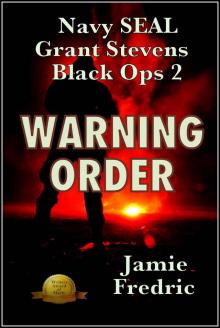 Warning Order
Warning Order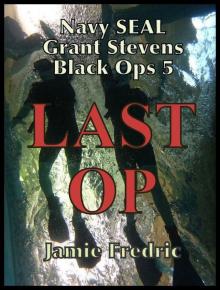 Last Op
Last Op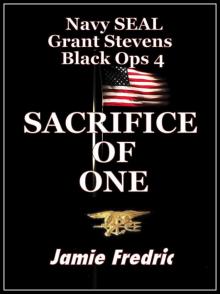 Sacrifice of One
Sacrifice of One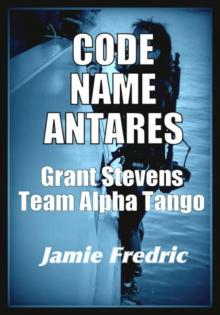 Code Name Antares
Code Name Antares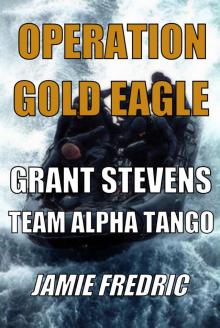 Operation Gold Eagle
Operation Gold Eagle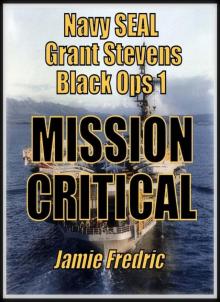 Mission Critical
Mission Critical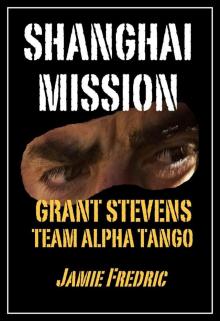 Shanghai Mission
Shanghai Mission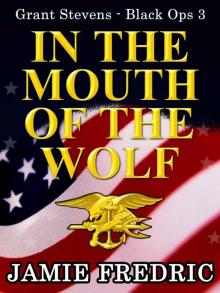 In the Mouth of the Wolf
In the Mouth of the Wolf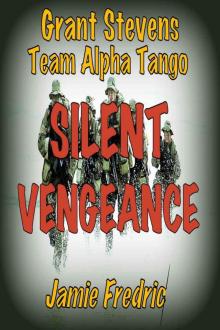 Silent Vengeance
Silent Vengeance